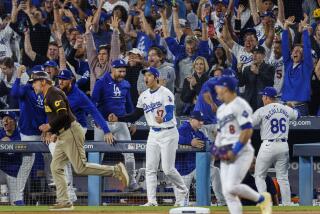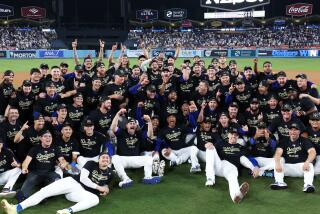. . . And to Celebrate, Ballard Made a Burger Run
The office was filled with leather and self-assurance. The man behind the wooden desk, with his gray hair and pale skin, was filled with authority. Outside were stately palm trees and royal sunshine and, several miles away, an ocean. All of which made me wonder: What was that empty French fries bag doing in the garbage can?
It was the winter of 1981, and I was preparing to make a decision that would eventually give me a new heart for this game. And then, four wonderful years later, break that heart.
The man behind the desk was Ray Kroc, founder of McDonald’s fast food chain and owner of the San Diego Padres. Standing around him were a couple of people as strange to me as Ronald McDonald: Kroc’s son-in-law, Ballard Smith, who also happened to be the club president, and Jack McKeon, the general manager, who smelled like a cigar. Come to think of it, he dressed like one, too.
Spread out in front of me was the strangest thing of all. It was a contract to manage the Padres, the laughable, impossible-to-love Padres.
In strike-shortened 1981, they’d finished 26 games out of first place. I asked myself, how can you play just 110 games and still finish 26 games out of first place? This was a franchise that had behaved like it was managed by a television announcer. Oh yeah--they were. Jerry Coleman bossed them in 1980.
But what the hell, I thought, even with all these strange things around me, why not? The money was good, and the team surely was willing to accept a little instruction. In other words, the players knew if they didn’t listen, the world wouldn’t blink when I engineered the firing of every sorry one of them.
And so I as looked down at the three-year contract, I announced for the second and final time that I’d agree to sign it.
“All right, let’s celebrate,” shouted Ray Kroc, who then pointed to Ballard Smith. “Why don’t you run over to the McDonald’s and pick up some food. Dick, your order?”
Run over to where ? The club president getting sent out for Big Macs? Oh my God, what had I done?
And so began the McNightmare chapter of my life, the one that reads like a novel. In San Diego, more than in any other city I’ve worked, my stay had a definite beginning, a climax and an ending.
I spent 1982 and 1983 helping bring the franchise to respectability for the first time in its life. I peaked with the 1984 pennant. Norma and I were happy enough that we never wanted to leave. But then I went through a disastrous downfall in 1985 and finally was forced to quit on the first day of 1986 spring training.
In the beginning, it was all so simple. My lineup was awful, filled with players who had been going through the motions, thinking nobody would notice since they lived and worked in the big shadow of those guys 120 miles up the road, the Dodgers. The Padres were never criticized by the manager or the media. Like many other folks who had moved to San Diego, they had come to retire.
So simple. McKeon, a former manager who made more moves as a general manager than he’d ever made on the field (possibly because as a general manager, he was always awake) was more than willing to change all that for me. He helped me get rid of the malcontents, brought in some tough players who cared and in general acted like he wanted the franchise to succeed. If only I’d known there was just one thing he really wanted. My job.
In 1981, the year before I arrived, the opening day lineup featured Terry Kennedy at catcher, Randy Bass at first base, Juan Bonilla at second base, Ozzie Smith at shortstop, Luis Salazar at third and an outfield of Ruppert Jones, Gene Richards and Dave Edwards. Three years later, the team I took into the playoffs and World Series had just one of those starters--Kennedy. Unfortunately, he gave me more gray hairs than any of the guys we sent away. Kennedy didn’t have a mental or physical problem but an equipment problem. He needed a diaper.
Amid a group that eventually developed more character than even I could have imagined, Kennedy always had to be different. When Steve Garvey became such a popular player for us, Kennedy resented it. His locker was next to Garvey’s until, at one large media session involving Garvey, he made a big scene of packing up and moving far across the room. He would whine when he didn’t feel he was getting enough attention and cry when he felt he got too much.
Other than Kennedy, by the time we reached 1984, the rest of my starting position players were new. At all my other managerial stops, I’d molded winners out of players who were already present. Doing it the San Diego way was perhaps a more difficult feat, considering there was a chance that guys wouldn’t hate just me, but also each other.
More to Read
Go beyond the scoreboard
Get the latest on L.A.'s teams in the daily Sports Report newsletter.
You may occasionally receive promotional content from the Los Angeles Times.











